57 Results

- Subject:
- Economics
- Material Type:
- Unit of Study
- Provider:
- Rice University
- Provider Set:
- OpenStax College

By the end of this section, you will be able to:
Understand the arguments for and against requiring the U.S. federal budget to be balanced
Consider the long-run and short-run effects of a federal budget deficit
- Subject:
- Applied Science
- Material Type:
- Module
- Date Added:
- 09/20/2018

- Subject:
- Economics
- Material Type:
- Unit of Study
- Provider:
- Rice University
- Provider Set:
- OpenStax College

By the end of this section, you will be able to:
Contrast expansionary monetary policy and contractionary monetary policy
Explain how monetary policy impacts interest rates and aggregate demand
Evaluate Federal Reserve decisions over the last forty years
Explain the significance of quantitative easing (QE)
- Subject:
- Applied Science
- Material Type:
- Module
- Date Added:
- 09/20/2018

- Subject:
- Economics
- Material Type:
- Unit of Study
- Provider:
- Rice University
- Provider Set:
- OpenStax College

By the end of this section, you will be able to:
Explain crowding out and its effect on physical capital investment
Explain the relationship between budget deficits and interest rates
Identify why economic growth is tied to investments in physical capital, human capital, and technology
- Subject:
- Applied Science
- Material Type:
- Module
- Date Added:
- 09/20/2018
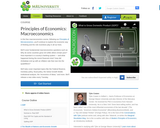
With this free video resource, students will explore the economic way of thinking, and the role incentives play in all our lives through engaging Hollywood production style videos.
Educators can use MRU's videos in a variety of ways, to include “flipping” the classroom, as study aids, supplementary material, concept reinforcement, or even as a full course offering.
In MRU's Principles of Macroeconomics course, we’ll cover fundamental questions such as: Why do some countries grow rich while others remain poor? How important is a country’s banking system — and what happened during the recent financial crisis? How did Zimbabwe end up with an inflation rate that rose into the quadrillions?
We’ll also cover important topics like the Federal Reserve, monetary policy, fiscal policy, the Solow Growth Model, institutional analysis, the “economics of ideas,” and more.
------------------------------------
What is Marginal Revolution University (MRU)?
Many of us can remember our first great economics teacher who fundamentally changed how we see the world. At MRU, we try and deliver that experience to millions worldwide through video.
Founded as a nonprofit in 2012 by George Mason University economics professors Tyler Cowen and Alex Tabarrok, MRU is building the world’s largest online library of free economics education videos -- currently weighing in at more than 800 videos.
- Subject:
- Economics
- Social Science
- Material Type:
- Full Course
- Homework/Assignment
- Lecture
- Module
- Provider:
- Marginal Revolution University
- Author:
- Alex Tabarrok
- Tyler Cowen
- Date Added:
- 04/04/2019

Table of Contents
Acknowledgments
Chapter 1: Introduction to Public Policy
Chapter 2: Origins and Actors
Chapter 3: Foundations of the Policy Process
Chapter 4: Problem Identification and Agenda Setting
Chapter 5: Policy Design and Formulation
Chapter 6: Policy Implementation
Chapter 7: Policy Analysis and Evaluation
- Subject:
- Political Science
- Social Science
- Material Type:
- Textbook
- Provider:
- University of North Georgia Press
- Author:
- John Powell Hall
- Keith E. Lee Jr.
- Kimberly Martin
- Date Added:
- 10/26/2023
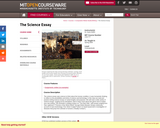
" The science essay uses science to think about the human condition; it uses humanistic thinking to reflect on the possibilities and limits of science and technology. In this class we read and practice writing science essays of varied lengths and purposes. We will read a wide variety of science essays, ranging across disciplines, both to learn more about this genre and to inspire your own writing. This semester's reading centers on "The Dark Side," with essays ranging from Alan Lightman's "Prisoner of the Wired World" through Robin Marantz Henig's cautionary account of nano-technology ("Our Silver-Coated Future") to David Quammen's investigation of diseases that jump from animals to humans ("Deadly Contact")."
- Subject:
- Arts and Humanities
- Business and Communication
- Ecology
- Education
- Educational Technology
- Journalism
- Natural Science
- World Cultures
- Material Type:
- Full Course
- Provider:
- M.I.T.
- Provider Set:
- M.I.T. OpenCourseWare
- Author:
- Boiko, Karen
- Date Added:
- 01/01/2009
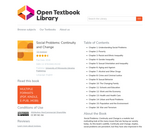
Social Problems: Continuity and Change by Steve Barkan is a realistic but motivating look at the many issues that are facing our society today. As this book’s subtitle, Continuity and Change, implies, social problems are persistent, but they have also improved in the past and can be improved in the present and future, provided that our nation has the wisdom and will to address them.
It is easy for students to read a social problems textbook and come away feeling frustrated by the enormity of the many social problems facing us today. Social Problems: Continuity and Change certainly does not minimize the persistence of social problems, but neither does it overlook the possibilities for change offered by social research and by the activities of everyday citizens working to make a difference. Readers of Steve Barkan’s book will find many examples of how social problems have been improved and of strategies that hold great potential for solving them today and in the future.
You will find several pedagogical features help to convey the “continuity and change” theme of this text and the service sociology vision in which it is grounded: Each chapter begins with a “Social Problems in the News” story related to the social problem discussed in that chapter. These stories provide an interesting starting point for the chapter’s discussion and show its relevance for real-life issues. Three types of boxes in each chapter provide examples of how social problems have been changed and can be changed.
- Subject:
- Social Science
- Sociology
- Material Type:
- Textbook
- Provider:
- University of Minnesota
- Provider Set:
- University of Minnesota Libraries Publishing
- Author:
- Steven Barkan
- Date Added:
- 02/20/2019
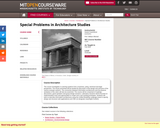
The course will investigate e-Learning systems from a business, policy, technical and legal perspective. The issues presented shall be tackled by discussion of the design and structure of the various example systems. The connection between information architectures and the physical workplace of the users will also be examined. There course will be comprised of readings, discussions, guest speakers and group design sessions. Laboratory sessions will be focused on implementation tools and opportunities to create one's own working prototypes. Students will learn to describe information architectures using the Unified Modeling Language (used to specify, design and structure web applications) and XML (to designate meaningful content).
- Subject:
- Applied Science
- Architecture and Design
- Material Type:
- Full Course
- Provider:
- M.I.T.
- Provider Set:
- M.I.T. OpenCourseWare
- Author:
- Mitchell, William John
- Date Added:
- 01/01/2000
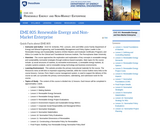
The primary goal of this course is to provide a toolset for characterizing and strategizing how nonmarket forces can shape current and future renewable energy markets. The course approaches the exploration and explanation of key concepts in renewable energy and sustainability nonmarket strategies through evidence-based examples. Main topics for the course include: a sociological approach to markets, renewable energy markets, nonmarket conditions, complex systems analysis, and renewable energy technology and business environments. Because renewable energy costs are higher than fossil fuel cost per unit of energy, the main arguments in support of renewable energy, thus far, are functionally nonmarket in character, i.e., environmental (e.g., climate change), political (e.g., energy independence), and/ or social (e.g., good stewardship).
- Subject:
- Applied Science
- Business and Communication
- Economics
- Engineering
- Marketing
- Social Science
- Material Type:
- Full Course
- Provider:
- Penn State University
- Provider Set:
- Penn State's College of Earth and Mineral Sciences (http:// e-education.psu.edu/oer/)
- Author:
- Erich Schienke
- Date Added:
- 04/25/2019
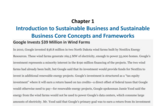
The issue of sustainability and specifically sustainable business is of increasing interest and importance to students of business and also students in the sciences, government, public policy, planning and other fields. There can be significant benefits from students learning about sustainable business from the rich experiences of business practice.
The Sustainable Business Case Book by Gittell, Magnusson and Merenda is one of the first of its kind. It combines the the theory of sustainability with key concepts, analytical information and contextual information with a collection of cases which provide insights, perspective and practical guidance on how sustainable businesses operate from different business functional area perspectives.
The Sustainable Business Case Book can be used as a stand-alone text or as a supplemental textbook for undergraduate courses that have an interest in sustainable business. While the book’s primary focus is on the relationship between business and sustainability, the book can also be used in courses offered in fields other than business, including environmental and earth systems sciences, environmental studies, urban planning, economics and public policy.
The first part of The Sustainable Business Case Book, Chapter 1 through Chapter 3, introduces students to the meaning of sustainability, and the practice of sustainable business. The introductory chapters also describe key concepts, analytical frameworks, and contextual information relevant for the understanding of business sustainability. Chapter 1, defines sustainability and describes how and why businesses choose to engage in sustainable practices and how sustainable business practices relate to corporate profitability and social responsibility. Chapters 2 and 3 provide important background and contextual information affecting sustainable business practice. Chapter 2, The Science of Sustainability, reviews scientific evidence about climate change and the human and business influences on climate change. Chapter 3, Sustainability, Public Policy and Business, describes the significant role of government and public policy in sustainability, including setting the rules, regulations and laws that define the market and market opportunities for sustainable business practice.
Table of Contents
Chapter 1: Introduction to Sustainable Business and Sustainable Business Core Concepts and Frameworks
Chapter 2: The Science of Sustainability
Chapter 3: Government, Public Policy, and Sustainable Business
Chapter 4: Accountability for Sustainability
Chapter 5: Entrepreneurship, Innovation, and Sustainable Business
Chapter 6: Sustainable Business Marketing
Chapter 7: Case: Sustainable Business Entrepreneurship: Simply Green Biofuels
Chapter 8: Case: Marketing Sustainability: Seventh Generation Creating a Green Household Consumer Product
Chapter 9: Case: Brewing a Better World: Sustainable Supply Chain Management at Green Mountain Coffee Roasters, Inc.
Chapter 10: Case: Oakhurst Dairy: Operations Management and Sustainability
Chapter 11: Case: Accounting for Sustainability: How Does Timberland Do It and Why?
Chapter 12: Case: Sustainable Investing: Pax World Helping Investors Change the World
Chapter 13: Case: Strategic Mission–Driven Sustainable Business: Stonyfield Yogurt
- Subject:
- Business and Communication
- Material Type:
- Textbook
- Provider:
- The Saylor Foundation
- Provider Set:
- Saylor Textbooks
- Author:
- Matt Magnusson
- Michael Merenda
- Ross Gittell
- Date Added:
- 04/24/2019
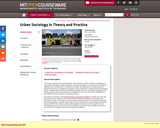
This course explores the creative dialectic—and sometimes conflict—between sociology and urban policy and design. Topics include the changing conceptions of "community," the effects of neighborhood characteristics on individual outcomes, the significance of social capital and networks, the drivers of categorical inequality, and the interaction of social structure and political power. Students will examine key theoretical paradigms that have constituted sociology since its founding, assess how and why they have changed over time, and discuss the implications of these shifts for urban research and planning practice.
- Subject:
- Social Science
- Sociology
- Material Type:
- Full Course
- Provider:
- M.I.T.
- Provider Set:
- M.I.T. OpenCourseWare
- Author:
- Aditi Mehta
- Justin Steil
- Date Added:
- 01/01/2016


